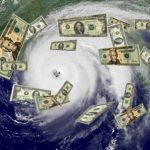Just as the warm, moist air of late summer engenders the destructive fury of hurricanes, so too do these storms bear the perennial fruit of economic ignorance. Like clockwork the talking heads either eagerly forecast economic prosperity or decry the mendacity of the evil price “gouger.” Or both. The former is the classic example of the broken window fallacy, which like a case of herpes, will never be fully expunged from humanity’s collective consciousness. The error lies in focusing on seen benefits while ignoring unseen harm. We are implored to consider the benefits of jobs that will be created as we set about rebuilding lost homes, towns, and infrastructure. But this economic activity is not enhanced; rather merely diverted. All the money spent on rebuilding would have, absent the hurricanes, been spent on other goods and services. It is those markets and industries that will in turn see economic decline as fewer people spend in those areas. Even if argued that the rebuilding funds come exclusively from the savings coffers of insurance carriers therefore it wasn’t going to be used anytime soon, that still does not change the economic dynamics. A huge influx of “new” cash competing for a fixed amount of supplies does nothing but cause prices to rise for everyone else (e.g. building supplies will be in higher demand therefore all users of such supplies nationwide will experience higher prices). These higher prices mean, again, fewer dollars to spend on other goods. The only sense in which one could argue that net economic activity increases is if we assign no value to leisure. Certainly if one works 12 hours a day rather than 8 to both rebuild what was lost and maintain what one still has, then output is indeed greater. But is that the world we want to live in, where we sacrifice leisure in the name of economic output? Why we don’t need a destructive storm to achieve that, just pass a law enforcing a 16 hour work day and we could double GDP overnight! Destruction is not the path to an economic free lunch. Everything has a trade-off. The only path to prosperity is through savings, capital accumulation, and investment of that capital toward avenues that make production more efficient (i.e. cheaper).
The price gouger fulfills a valuable economic role, namely the rationing of constrained supplies in direct correlation to need. The feedback is immediate and perfect. There is no need for the imprecision of someone overseeing how much has Person A bought in such and such time period if rationing is imposed by pubic or private diktat. This issue is not so much of a fallacy since people do generally understand principle that if supply goes down prices will go up. Rather, it is more of an issue of emotion; each person’s barometer of what a “fair” increase amounts to varies. The fallacy is in believing that someone charging an “unfair” amount deserves to be thrown in a cage. As much as people would like to redefine words, “victim” does not describe someone who paid more than they would have preferred. So, no victim, no crime and thus any laws against price “gouging” are themselves victimizing when those with a true need find nothing but empty shelves. Trading willfully unobserved harms for spurious benefits leaves us all vulnerable.
